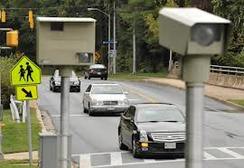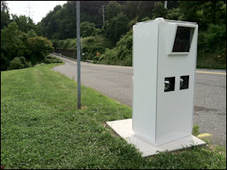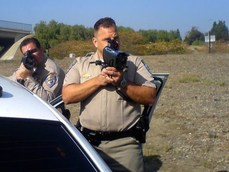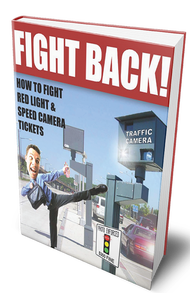How We Got Our Start
Disdain Traffic Tickets? Us too. Under the pretext of safety, an overbearing presence is employing robots and AI to drain motorists' wallets.
It's time for resistance, and that's precisely what we did. Introducing "Fight Back! How To Fight Red Light & Speed Camera Tickets," a result of our efforts.
Drawing upon collective wisdom from fellow drivers and traffic ticket attorneys, we harnessed the potential of AI to compile effective strategies for getting your red light or speed camera tickets successfully dismissed.
It's time for resistance, and that's precisely what we did. Introducing "Fight Back! How To Fight Red Light & Speed Camera Tickets," a result of our efforts.
Drawing upon collective wisdom from fellow drivers and traffic ticket attorneys, we harnessed the potential of AI to compile effective strategies for getting your red light or speed camera tickets successfully dismissed.
Proven Defense Case Dismissed
Our team had 3823 traffic court cases dismissed by simply following the instructions we are providing you in this eBook. You, too, can have the knowledge to fight back & Win. You’ll learn what documents to ask for in such defenses as “Discovery”, "Material Omission" and “Engineering” defense and what to look for in a “Defect On The Ticket” defense and much more. We’ll explain the laws that allow such things as trial by camera and the “cash cow” profits of the red light and speed camera tickets.
Take a stand against unjust traffic tickets.
It's your money. You worked hard for it.
Government actors use fines and fees to attempt to offset the costs of their operations, and threaten strict penalties for not paying up. Through it, the criminal legal system relies heavily on collecting money from the very people targeted by the system. When people can’t pay, they face mounting penalties: more fines and fees, driver’s license suspensions, longer terms of probation, and even arrests and incarceration. If someone is then caught driving when their license is suspended or breaking a probation rule, they face arrest and incarceration again. Police are then charged by the courts to enforce these punishments, acting as debt collectors on behalf of the state and giving them a reason to target people the system has already harmed. Thus, these penalties inextricably link fines and fees to over-policing, criminalization, and mass incarceration.
The human toll is devastating, often sparked by small infractions. In a recently published ACLU report, one person interviewed on how fines and fees impacted them said it all started with a $175 fine for illegally tinted windows. After additional court fees were added to that ticket, he owed over $1,000. When he couldn’t afford to pay, he lost his driver’s license, faced arrest warrants, incarceration, and additional fines and fees amounting to thousands of dollars. As a result, he lost his job and health insurance, his credit score declined, he was hospitalized multiple times for anxiety attacks, and he still struggles five years later when deciding whether to pay this debt or buy food. His experience is typical for millions of people who cannot afford to pay their tickets.
Without intervention, the fees and fines system will continue to spin out of control. One recent study estimated that judges have the choice of whether to impose a fee or fine in well over 30 million low-level cases per year — not even including traffic cases. Courts already take advantage of this option often — the percentage of people convicted in the U.S. who received court-ordered fines grew from 25 percent to 66 percent from 1991 to 2004. The amounts charged snowball, making it impossible for some people to afford paying them off. In 2019, the Federal Reserve reported that 6 percent of adults had outstanding legal or court debt. But this doesn’t impact everyone equally — Black adults (12 percent) and Latinx adults (9 percent) are more likely to have these debts than white adults (5 percent). The more people that cannot afford to pay and are punished with police intervention and time behind bars, the less money these local governments make as they spend significantly more to enforce the debt than they will receive.
Now is the time to stop balancing budgets through ticketing. Nevada’s latest reform is a significant step in that direction: Decriminalizing minor traffic offenses so that nonpayment cannot result in warrants for arrest will decrease policing for profit and debtor’s prisons. It will also alleviate police, court, and incarceration costs across the state.
But this is only the first step — all state legislatures should pass laws to:
The privatization of traffic law enforcement is rapidly spreading across the United States. Approximately 700 local jurisdictions have partnered with for-profit companies to install camera systems at intersections and along roadways to encourage compliance with traffic signals and speed limits.
While automated traffic enforcement systems can be a useful tool for enhancing safety for drivers and pedestrians, there is a concern when private firms and municipalities prioritize revenue over safety, compromising the public interest.
Before pursuing contracts for camera systems, local governments should follow the advice of the Federal Highway Administration and first explore traffic engineering solutions for problematic intersections or roadways. If it is determined that private enforcement systems are appropriate, they should avoid agreements that limit future decisions regarding safety measures. The use of privatized traffic law enforcement should solely focus on enhancing traffic safety rather than serving as a revenue stream for municipalities or private firms.
Current data reveals that about half of the U.S. states have authorized the use of red-light cameras, with approximately 693 local governments utilizing or planning to implement such systems. Moreover, 92 jurisdictions have contracts for automated speed limit enforcement cameras, collectively impacting around 60 million people or one in five Americans.
These camera systems automatically detect traffic law violations, capturing images of offending vehicles and their license plates. Vendors issue tickets, subject to approval by local authorities, which are then mailed to the registered owners of the vehicles.
This trend of privatized traffic enforcement is part of a broader pattern of local governments outsourcing various services, including toll roads, parking meters, water and sewer assets, and even public safety services, to private companies.
However, certain contracts between private camera vendors and cities prioritize profit over traffic safety, creating potential issues:
The privatized traffic enforcement industry has considerable political influence, lobbying to expand authorization for private traffic law enforcement to more states and marketing enforcement systems to communities.
To protect the public interest, local governments should adhere to the following principles when considering or renewing contracts for privatized traffic law enforcement:
Divest
Our team had 3823 traffic court cases dismissed by simply following the instructions we are providing you in this eBook. You, too, can have the knowledge to fight back & Win. You’ll learn what documents to ask for in such defenses as “Discovery”, "Material Omission" and “Engineering” defense and what to look for in a “Defect On The Ticket” defense and much more. We’ll explain the laws that allow such things as trial by camera and the “cash cow” profits of the red light and speed camera tickets.
Take a stand against unjust traffic tickets.
It's your money. You worked hard for it.
Government actors use fines and fees to attempt to offset the costs of their operations, and threaten strict penalties for not paying up. Through it, the criminal legal system relies heavily on collecting money from the very people targeted by the system. When people can’t pay, they face mounting penalties: more fines and fees, driver’s license suspensions, longer terms of probation, and even arrests and incarceration. If someone is then caught driving when their license is suspended or breaking a probation rule, they face arrest and incarceration again. Police are then charged by the courts to enforce these punishments, acting as debt collectors on behalf of the state and giving them a reason to target people the system has already harmed. Thus, these penalties inextricably link fines and fees to over-policing, criminalization, and mass incarceration.
The human toll is devastating, often sparked by small infractions. In a recently published ACLU report, one person interviewed on how fines and fees impacted them said it all started with a $175 fine for illegally tinted windows. After additional court fees were added to that ticket, he owed over $1,000. When he couldn’t afford to pay, he lost his driver’s license, faced arrest warrants, incarceration, and additional fines and fees amounting to thousands of dollars. As a result, he lost his job and health insurance, his credit score declined, he was hospitalized multiple times for anxiety attacks, and he still struggles five years later when deciding whether to pay this debt or buy food. His experience is typical for millions of people who cannot afford to pay their tickets.
Without intervention, the fees and fines system will continue to spin out of control. One recent study estimated that judges have the choice of whether to impose a fee or fine in well over 30 million low-level cases per year — not even including traffic cases. Courts already take advantage of this option often — the percentage of people convicted in the U.S. who received court-ordered fines grew from 25 percent to 66 percent from 1991 to 2004. The amounts charged snowball, making it impossible for some people to afford paying them off. In 2019, the Federal Reserve reported that 6 percent of adults had outstanding legal or court debt. But this doesn’t impact everyone equally — Black adults (12 percent) and Latinx adults (9 percent) are more likely to have these debts than white adults (5 percent). The more people that cannot afford to pay and are punished with police intervention and time behind bars, the less money these local governments make as they spend significantly more to enforce the debt than they will receive.
Now is the time to stop balancing budgets through ticketing. Nevada’s latest reform is a significant step in that direction: Decriminalizing minor traffic offenses so that nonpayment cannot result in warrants for arrest will decrease policing for profit and debtor’s prisons. It will also alleviate police, court, and incarceration costs across the state.
But this is only the first step — all state legislatures should pass laws to:
- Decriminalize all low-level offenses, including but not limited to traffic violations
- Remove fees as an option for local stakeholders to impose on remaining offenses
- Make fines more affordable and equitable by considering a person’s income
- Require proportionality of a fine compared to the offense
- Ban police from enforcing payments, thereby reducing unnecessary police contact
- End warrants and penalties for failure to pay
The privatization of traffic law enforcement is rapidly spreading across the United States. Approximately 700 local jurisdictions have partnered with for-profit companies to install camera systems at intersections and along roadways to encourage compliance with traffic signals and speed limits.
While automated traffic enforcement systems can be a useful tool for enhancing safety for drivers and pedestrians, there is a concern when private firms and municipalities prioritize revenue over safety, compromising the public interest.
Before pursuing contracts for camera systems, local governments should follow the advice of the Federal Highway Administration and first explore traffic engineering solutions for problematic intersections or roadways. If it is determined that private enforcement systems are appropriate, they should avoid agreements that limit future decisions regarding safety measures. The use of privatized traffic law enforcement should solely focus on enhancing traffic safety rather than serving as a revenue stream for municipalities or private firms.
Current data reveals that about half of the U.S. states have authorized the use of red-light cameras, with approximately 693 local governments utilizing or planning to implement such systems. Moreover, 92 jurisdictions have contracts for automated speed limit enforcement cameras, collectively impacting around 60 million people or one in five Americans.
These camera systems automatically detect traffic law violations, capturing images of offending vehicles and their license plates. Vendors issue tickets, subject to approval by local authorities, which are then mailed to the registered owners of the vehicles.
This trend of privatized traffic enforcement is part of a broader pattern of local governments outsourcing various services, including toll roads, parking meters, water and sewer assets, and even public safety services, to private companies.
However, certain contracts between private camera vendors and cities prioritize profit over traffic safety, creating potential issues:
- Some contracts require cities to share ticket revenue with the camera vendor, incentivizing the issuance of more tickets for higher profits.
- "Cost-neutral" contracts tie payments to the number of tickets issued, encouraging a minimum number of citations to ensure the vendor's fees are covered.
- Problematic contracts may penalize cities if they extend the duration of yellow lights, prioritize certain types of violations, or fail to approve enough tickets, thus limiting the city's discretion in enforcing traffic regulations.
The privatized traffic enforcement industry has considerable political influence, lobbying to expand authorization for private traffic law enforcement to more states and marketing enforcement systems to communities.
To protect the public interest, local governments should adhere to the following principles when considering or renewing contracts for privatized traffic law enforcement:
- Prioritize public safety over potential revenues when evaluating traffic law enforcement options.
- Ensure contract language is free from conflicts of interest.
- Avoid incentives for vendors based on the number of tickets or fines issued.
- Retain complete public control over transportation policy decisions.
- Have the option to terminate contracts early if dissatisfied with the service or its effects.
- Ensure a transparent and participatory process when contracting with vendors.
- Make information about privatized traffic law enforcement operations easily accessible online.
- Restrict the use of information collected by camera vendors to traffic law enforcement purposes only.
- Consider establishing state standards to prevent unjustified contracts for automated enforcement s
Divest


















